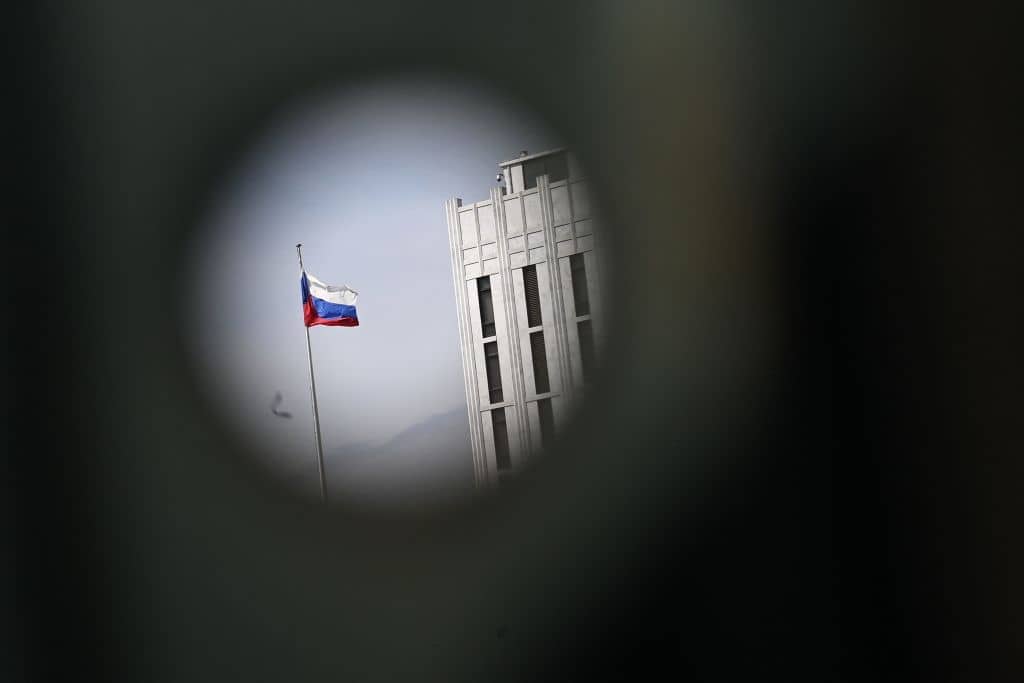One of the most difficult things about being in Russia at the moment is seeing people with whom you never had a problem – even liked – jumping on the war-bandwagon. A secretary at work where I lived in a city in the south of the country – we’ll call her Svetlana, she was probably my favourite person there until this started – has suddenly become a war-fanatic. ‘Ya za Rossii!’ she proclaims: ‘I’m for Russia!’. It’s said so chirpily it’s as if she’s discussing an election or a football match.
Seeing my dismay at her war-talk, she misinterprets it. ‘Oh come on!’ she trills. ‘You’re such a pessimist. Everything will be all right! You’ll see!’
The assumption that I’m blindly supporting Russia in this conflict is probably that which our friendship rests on. I’ve made no secret, throughout life, of my Russophilia. But the love isn’t unconditional.
We are, I realise, living in completely different – even enemy – worlds now. She goes home and watches the state-owned Russian TV, I read the Western press. In our minds, both of us are right. She sees reports of Ukrainian ‘fascists’, a ‘genocide’ on the Russian population in the Donbass, and hears that the Ukrainians are shooting up their own public buildings. I see the bombed-out streets of Kharkhiv, the refugees, the politicians who have stayed in Kiev but are open about the blind terror they feel for themselves and their families. Why, in her world, wouldn’t her conscience remain utterly clear?
‘It’s going to be like the nineties all over again,’ said a neighbour, which in Russia means, ‘We are returning to hell.’
I wait for Svetlana after work. I want to tell her that this isn’t the World Cup. I have friends in Ukraine and war means people like her losing people like her children. I want to ask if she can imagine for five seconds what a life after you’ve lost your children is like? I want to show her pictures of the little girl shot up with her family last week, reports of the devastation of Mariupol and the rising number of civilian deaths. I’d like to tell her how hard other countries find it to trust Russia and how many gazillion times this conflict makes it worse.
When she says ‘Bog znami‘ (‘God is with us’) I want to snap back that that’s lucky, as no one else is. But a part of me knows that this will do no good. This won’t turn me, in her eyes, into an interlocutor having a strong disagreement with her. It may well make me a ‘foreign agent’ spreading disinformation and lowering morale. Perhaps her TV channel has already warned her against such people and I will fit neatly into a ready-created role. It certainly isn’t a wise one to play in Russia at the moment.
Perhaps I’m lucky: a late phone call detains Svetlana and I don’t get my chance. Such conversations are risky at the moment. The authorities may not get you but your paranoia will. People here have always joked about me being an ‘English spy’ but it doesn’t seem such a joke now. A police car with a flashing light was parked outside my block on Tuesday. The next day, at the corner, were three burly, menacing-looking soldiers in combats (and if the war is doing anything here it is giving you a Pavlovian terror of military uniforms). Perhaps the soldiers were just buying a power-bank at the computer-store on the corner and the police officer had stopped to eat his lunch. But fear is producing a dreary, stomach-churning confirmation bias.
Luckily many people here are not like Svetlana. But what do they think? After the shock of the first few days, a reserve has settled into us and the only question you can safely ask is ‘How are you?’. This produces a roll of the eyes and a look of almost stagey fellow-feeling.
‘I don’t want to be pro-war or anti-war,’ said one friend, though even making such a statement put him in the latter camp. This man, I must say, has surprised me. A great maker of casually sexist or racist remarks, he too, to quote Yeats, has been changed in his turn – emerging in my group as the one person who seems to know the horror this war entails. When he says he wants to get out of the country but doesn’t know where Russians won’t be hated now, he’s mocked by another colleague – Anton, usually the most rational of men – who says loftily ‘Oh come on, Oleg…. Pull yourself together. I do not want to be ashamed of Russia.’
It is, of course, a kind of macho posture, but to me Anton sounds like a little boy saying ‘I don’t want to go the dentist.’ Shame, of course, is painful and as hard to ignore as toothache – and unfashionable in the first heady days of an invasion – but I find myself wanting to ask Anton where his red line is. What does Russia need to do to make him ashamed? At what exact number of casualties will shame become acceptable to him? But I don’t ask. Such conversations stay in the head.
People are unhappy, that’s all you know. The sanctions hit daily and Russians are scared. ‘It’s going to be like the nineties all over again,’ said a neighbour, which in Russia means, ‘We are returning to hell.’ But they are scared in a particularly Russian way. The refusal by tech firms to sell their products, the end of Apple Pay (which so many Russians rely on), the stories that cafes in Barcelona are putting up ‘No Russians served’ signs: all these become a subject for a kind of gossip and stunned fascination: let’s see how much further, how much more outlandish it can go. You can’t knock Russians for their daily bravery, their ability to accept whatever their rulers’ actions throw at them. But you don’t know whether to admire such stoicism or, in frustration, scream at it.
‘Are you seeing your friends?’ a concerned relative asked me. Not much, I explained: we’ve mostly retreated to our phone screens. ‘I feel that all the news is bad and that sharing our stories just makes us more anxious,’ wrote a colleague from a St. Petersburg, to explain her silence.
Then there are the people you actively avoid. The lady who listened to your story about being stopped by the FSB and then snapped ‘They’re only their job, Robert’ is surely best swerved right now. So is the jolly, gossipy actress whose family are pro-Putin. Both of them were fun to be with before all this – people who took me out and made me dinner but whose company will, in these changed circumstances, produce instant conflicts.
Only those zealously in favour of the war can safely unpack their thoughts now. For them this period can be a carnival of free speech. Mostly war stays the khaki-coloured elephant in the room as we carry on trying to live as normal. As I read news of the devastation of Kharkhiv, someone here wrote to enquire whether, in an English work email, it was better to use brackets or dashes to separate a thought. The texts between us, solving the problem, went back and forth for minutes. If war is a kind of madness, it can be found here as well as on the battlefield.






Comments